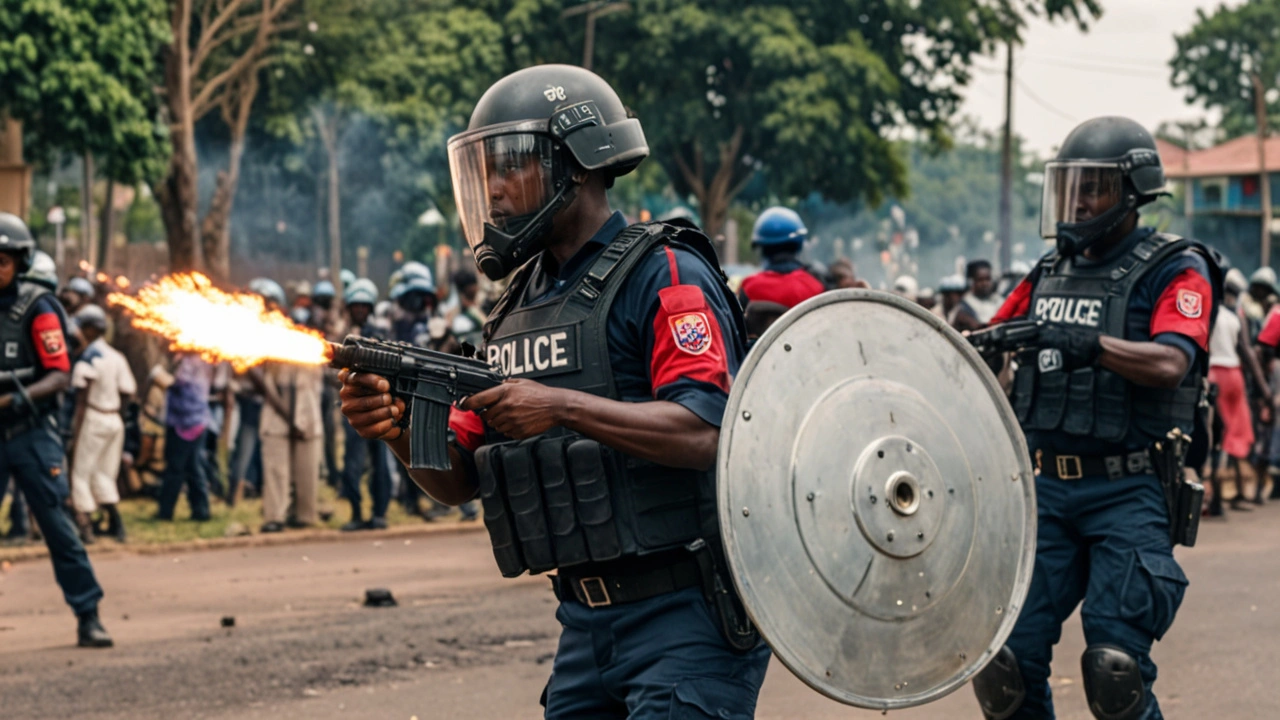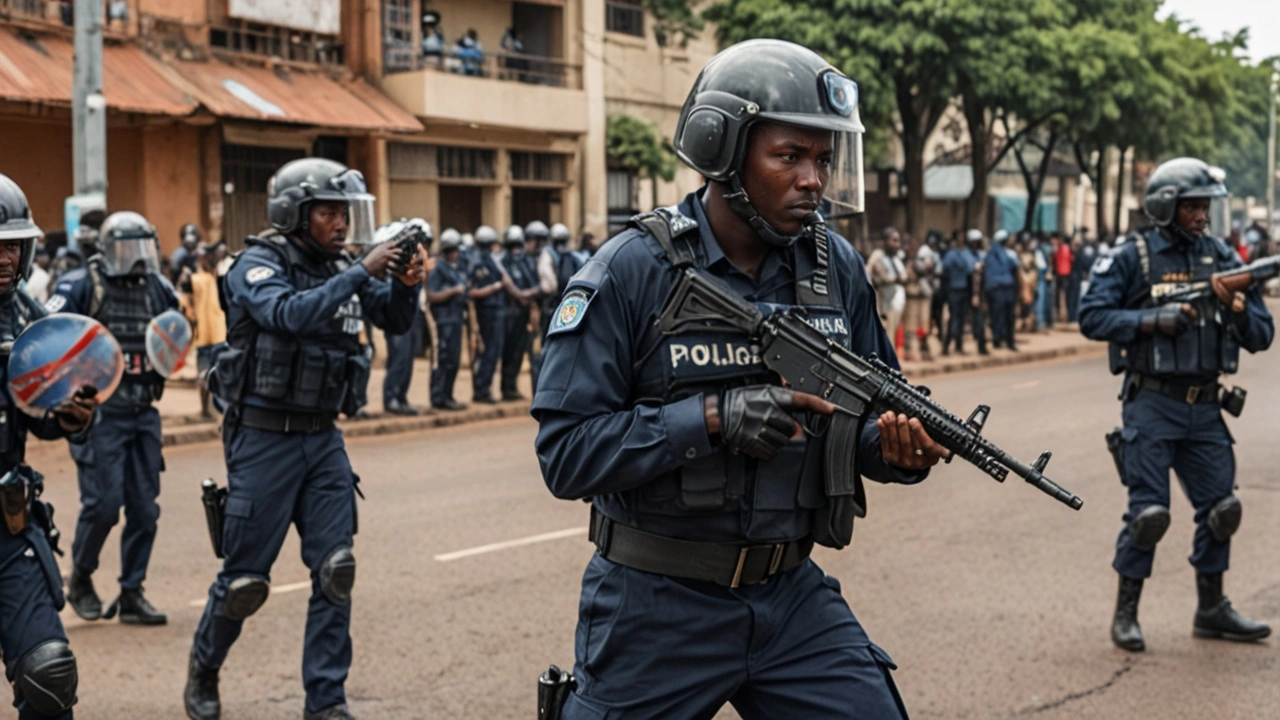Kenya's Police Chief Steps Down Amid Deadly Anti-Tax Protests
Kenya's police chief Japhet Koome has resigned following weeks of violent protests against proposed tax hikes, which tragically resulted in the deaths of over 40 individuals. The protests, sparked by the controversial finance bill, saw thousands of Kenyans taking to the streets to voice their discontent with the government's plans. The bill, which initially aimed to alleviate Kenya’s $80 billion debt burden, proposed significant tax increases that many felt were untenable in the current economic climate.
From the outset, the protests were marked by a significant degree of organization, largely coordinated by young Kenyans who utilized social media platforms to mobilize and share information. The protests quickly gained momentum, with demonstrators from various cities joining in solidarity. However, the peaceful demonstrations soon turned violent as clashes with law enforcement became increasingly frequent.
Human rights groups have vehemently accused the police of using excessive force throughout the protests. Reports indicate that hundreds of protesters were arrested and many were shot at by the police. Videos and images circulated online showing the chaotic scenes, with injured protesters being carried away amidst clouds of tear gas. The growing public outrage over these incidents put immense pressure on the government to take action.
President Ruto's Political Quake
The resignation of Japhet Koome comes just a day after President William Ruto dismissed most of his cabinet. This sweeping move was seen as an attempt to quell the unrest and address the demands of the protestors. President Ruto, who has come under intense scrutiny, has faced calls for his resignation, with protestors arguing that his government has failed to serve the interests of the people.
In the wake of these events, Deputy police chief Douglas Kanja has been appointed to take over the force immediately. His appointment is seen by many as a critical step towards restoring public trust in the police force. The challenges ahead for Kanja are considerable, including addressing allegations of police misconduct and ensuring that future protests are handled peacefully.
President Ruto has also announced plans to form a 150-member dialogue panel to tackle the various problems facing the country. This panel will include representatives from different sectors of society and is expected to address key issues such as the national debt, economic reform, and the upholding of human rights. The panel's establishment is an acknowledgment of the deep-seated issues that have driven the protests and is aimed at fostering a more inclusive and constructive dialogue between the government and its populace.
The Role of Youth and Social Media
The role of Kenya’s youth in these protests cannot be underestimated. With more than 75% of the population under 35, the youth have become a formidable force in shaping the nation's political landscape. Utilizing platforms like Twitter, Facebook, and WhatsApp, young Kenyans have been able to galvanize support, disseminate information rapidly, and maintain constant pressure on the government.
Social media has not only helped in organizing protests but has also shone a spotlight on the actions of law enforcement. Live streams, photos, and videos taken by protesters provided real-time updates to the public and international observers, ensuring that the intensity of the protests and the response by the police were widely known. This level of transparency has made it difficult for the government to downplay the seriousness of the unrest.
As the situation unfolds, the international community watches closely. The events in Kenya reflect a broader trend of youth-driven movements across the globe, where the internet and social media serve as powerful tools for advocacy and change. The coming weeks will be crucial in determining whether the government and the newly appointed police leadership can restore order and address the protestors' demands.

Future Prospects and Challenges
The resignation of Japhet Koome marks a significant chapter in Kenya’s ongoing struggle for social and economic justice. With the finance bill now withdrawn, the immediate economic pressure may have eased, but the underlying grievances remain. Protesters continue to call for President Ruto's resignation and broader structural reforms to address corruption, unemployment, and governance issues.
In the streets, tensions are still palpable. While some protesters have expressed cautious optimism about the dialogue panel, others remain skeptical about its potential impact. Ensuring that the panel's discussions lead to tangible changes will be a major test for President Ruto's administration. Meanwhile, international human rights organizations continue to monitor the situation, urging the Kenyan government to adhere to international standards of conduct and uphold the rights of its citizens.
Kenya’s path forward is fraught with challenges. Addressing the deep-seated economic and social issues will require concerted effort, transparency, and collaboration between the government and civil society. The hope is that through dialogue and meaningful reform, Kenya can emerge from this period of turmoil stronger and more unified.







Vida Yamini
Seeing how the police chief chose to step down after weeks of unrest really shows how the pressure from the streets can force change in Kenya it also highlights the fragile balance between security forces and citizens when tax policies feel like a heavy hand on already struggling families many of the protests were organized by young activists who used social media to spread their message the government’s attempt to raise taxes on top of an $80 billion debt was seen as an impossible burden for many people the resulting clashes turned tragic with over 40 lives lost which is a terrible cost for any nation the resignation of Japhet Koome may be a step toward rebuilding trust but there is still a long road ahead the new deputy chief will have to address allegations of excessive force and also find ways to de‑escalate future demonstrations the dialogue panel that President Ruto announced could be a venue for real conversation if it includes true representation from civil society and not just token voices the youth’s role cannot be underestimated they are the majority of the population and they have the energy to keep pressing for reforms the use of live streams and real‑time footage made it impossible for the authorities to hide the reality of the crackdown this transparency is a double‑edged sword it forces accountability but also fuels anger and more protests ultimately Kenya’s path forward depends on whether the government can listen, act, and genuinely address the root causes of discontent rather than merely reshuffling the top brass
James Lawyer
The resignation appears to be a tactical move to quell the unrest, yet the underlying fiscal challenges persist. A comprehensive review of the finance bill, with stakeholder input, would likely be more effective than isolated leadership changes. Moreover, ensuring adherence to international human‑rights standards remains crucial. The upcoming dialogue panel could serve as a constructive platform if it genuinely incorporates diverse perspectives.
Abby Culbertson
so sad what happened.
Awolumate Muhammed Abayomi
i think the youth are the real engine here they've shown amazing organiztion and drive even if some typos slip through their messages. the fact that they can rally so many people in such a short time is impressive. we need to listen to them and not just push back with force. maybe the new chief will learn from this and find better ways to engage.
Josh Tate
the whole situation feels like a massive wake‑up call for the govt. i feel for the families who've lost loved ones, it's heartbreaking. i also see the desperation behind the protestors demanding something fair. the police need proper training, and the leadership should be more transparent. we all deserve a voice.
John Smith
Let’s get real: the finance bill was a disaster from the start. Raising taxes on a populace already drowning in debt is pure folly. Historically, such moves spark unrest, and Kenya is no exception. The police chief’s resignation is merely a Band‑Aid. Real change comes from policy revision, not swapping uniforms.
Alex Soete
Hey folks, let’s channel this energy into constructive action! The youth have proven they can mobilize; now they can push for tangible reforms. Support the dialogue panel, attend local meetings, and keep the conversation alive. Together we can turn this turmoil into progress.
Cara McKinzie
Wow, another dramatic resignation. Like we haven’t seen a thousand of those before. The panel? Yeah, sure, let’s hope it’s not just another PR stunt. The protests will keep coming until real change happens.
Joseph Conlon
It’s fascinating how quickly a country can spiral when a financial proposal is perceived as unjust while at the same time the leadership chooses to play musical chairs. Some might argue the police chief’s exit is simply cosmetic, yet others see it as a symptom of deeper governance issues. The youth’s digital organization underscores a shift in how dissent is orchestrated, bypassing traditional channels. One could even suggest that the real crisis isn’t just the tax bill but the lack of meaningful dialogue that predates it. Nevertheless, the upcoming mechanisms, if genuinely inclusive, could foreshadow a new era of participatory politics-if they’re not just window dressing.
Mohit Singh
Honestly, the government's stance is both reckless and, oddly, understandable given the debt. They need revenue, but ripping people off is never the answer. The police response was aggressive, yet the protesters also escalated violence. Both sides share blame.
Damian Liszkiewicz
Reading this, I’m reminded of how power dynamics shape societal narratives 🌍. The resignation could signal a willingness to listen, but actions speak louder than titles. If the dialogue panel truly embraces pluralism, it might become a beacon for democratic renewal. Otherwise, it risks being a hollow gesture, another echo in the corridors of power. 🤔✨
Angela Arribas
Grammar check: “The police chief stepped down” not “step down”. Also, “over 40 individuals” should be “over 40 people”. Minor errors aside, the content lacks depth. 😐
Sienna Ficken
Oh, look at the “deep insights” - as if the article needed a crystal ball. Colorful vocab? Maybe try a dash of originality next time. The sarcasm is thick, but the facts remain unchanged.
Zac Death
It feels like the country is at a crossroads, and we’re all watching. The new police chief has a massive task ahead, but there’s room for optimism if genuine reform takes place. Let’s keep the dialogue open and supportive.
Lizzie Fournier
Honestly, the situation’s pretty intense, but it’s also a chance for Kenya to reset its priorities. Hope the panel actually listens and not just checks a box.
JAN SAE
Great overview!; The resignation is a pivotal moment; It opens a window for systemic change; Hopefully the new leadership will prioritize transparency; The dialogue panel could be the catalyst we need; Let’s stay engaged; The youth’s role cannot be understated; Their digital activism is reshaping politics; It’s essential for all stakeholders to collaborate; Only then can sustainable reforms be achieved.
Steve Dunkerley
From a governance perspective, the transition in police leadership presents an opportunity to integrate best‑practice protocols, especially around crowd‑control tactics. Leveraging data‑driven risk assessments could mitigate future escalations. Moreover, establishing transparent accountability mechanisms aligns with both domestic expectations and international human‑rights obligations.
Jasmine Hinds
Wow, what a whirlwind! Can't wait to see how it all pans out 😊